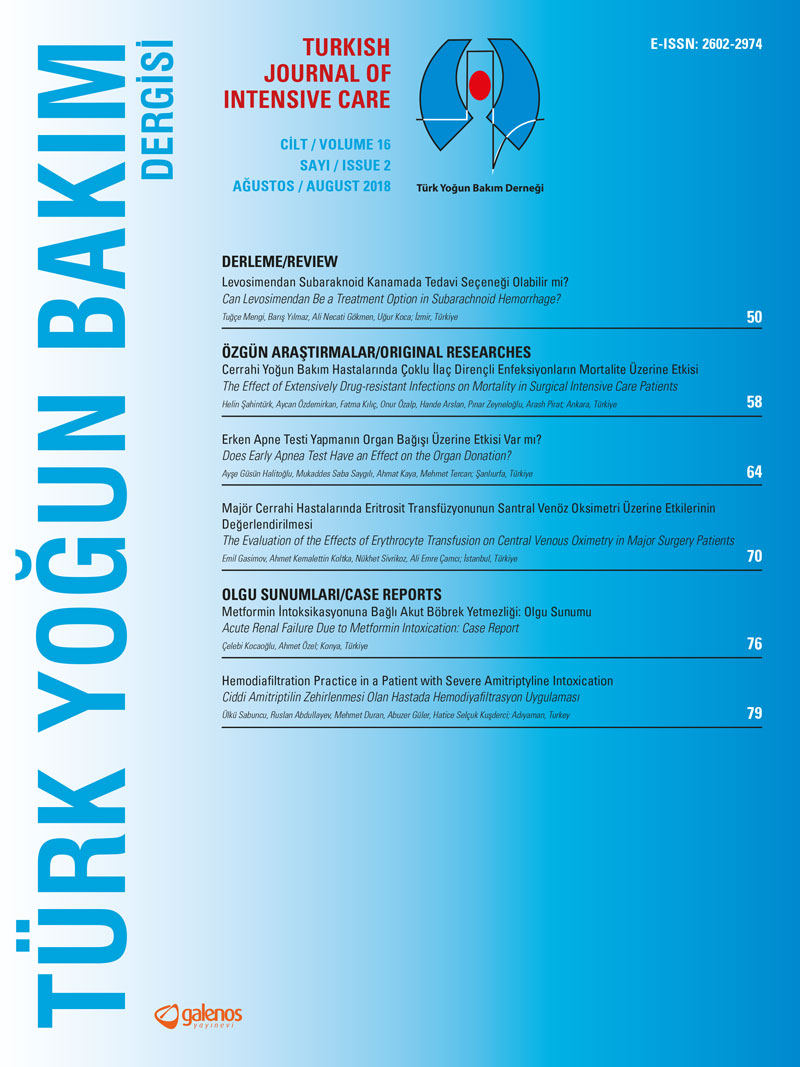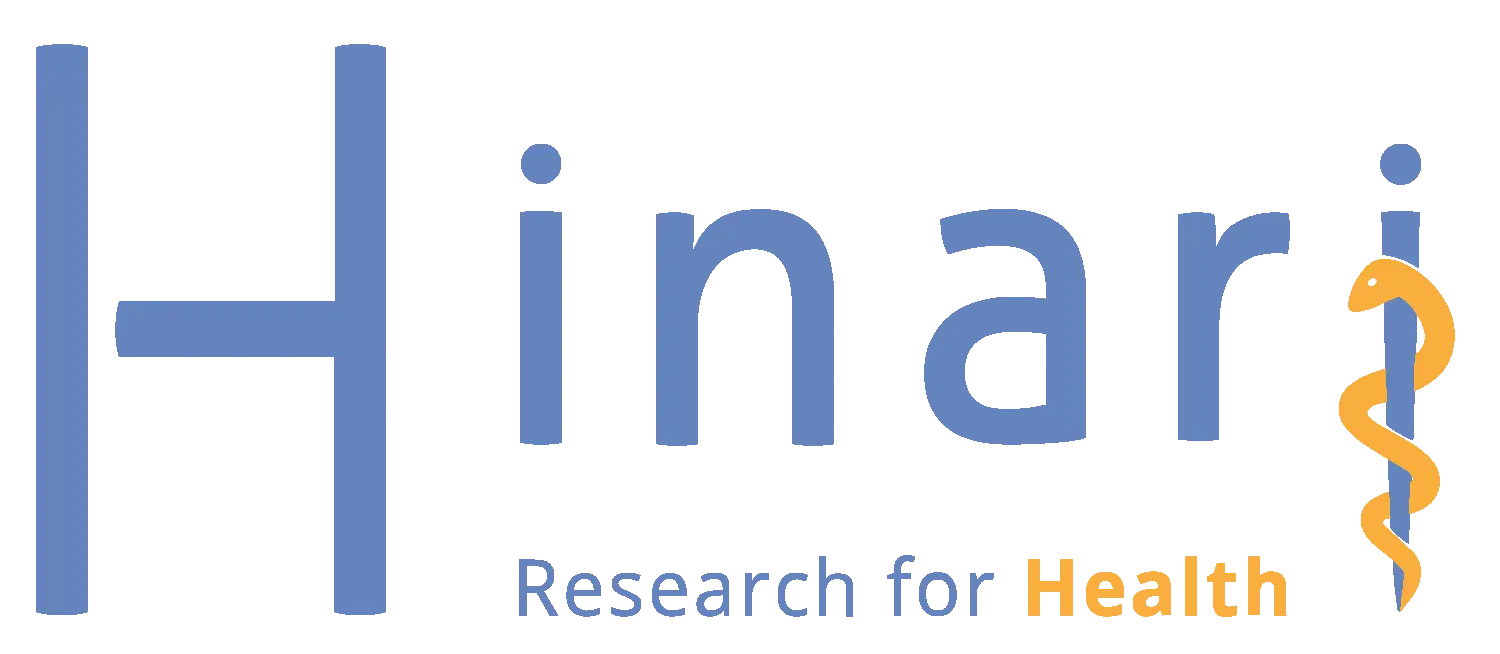Abstract
Tricyclic antidepressants are widely used drugs for treatment of depression despite serious mortality and morbidity in higher doses. They can cause severe cardiac arrhythmias, hypotension and central nervous system depression. Some patients may remain unresponsive in spite of conventional therapies such as gastric lavage and activated charcoal administration, benzodiazepines, volume replacement, lidocaine and sodium bicarbonate infusion. In this paper we report a 20-year-old female patient who had severe amitriptyline intoxication with a Glasgow Coma Scale score 4 and severe cardiac arrhythmias and was treated with hemodiafiltration. Conventional therapy was inadequate and hemodiafiltration was applied to the patient for 36 hours. At the end of the 36-hours the patient was conscious and became stabilized in terms of hemodynamics. In case of serious intoxication that does not respond to conventional therapy, approaches like hemodialysis, plasmapheresis, hemoperfusion and hemodiafiltration can be a rescue therapy and they should be considered.
Keywords: Amitriptyline, hemodiafiltration, tricyclic antidepressive agents
Introduction
Tricyclic antidepressants (TADs) are widely used drugs for different indications such as depression, neuropathic pain, nocturnal enuresis, obsessive-compulsive, panic and attention deficit hyperactivity disorders. These agents are the most prescribed drugs following selective serotonin reuptake inhibitors for depression (1). Taken in high doses either on purpose or accidentally they can result in serious morbidity and mortality. Data of 2008 from Turkey’s National Poison Consultation Center reveals that amitriptyline ranks 3rd, after paracetamol and combined upper respiratory tract infection treatment drugs, according to the classification made by reference active ingredient (2). Amitriptyline increases noradrenaline and serotonin levels by inhibiting their reuptake from the synaptic cleft (3). It also blocks adrenergic, histaminergic, central and peripheral cholinergic receptors. Toxicity symptoms are the results of the effects of amitriptyline in different systems. Dryness and metallic taste in the mouth, mydriasis, constipation, urinary retention, respiratory depression, and decreased cognitive functions and tachycardia occur due to the cholinergic receptor blockade. Weight gain, sedation and depression of central nervous system (CNS) are due to histamine receptor blockade. TADs contribute to hypotension by blocking alpha-adrenergic receptors and cardiac fast sodium channels by a mechanism similar to guanidine. They also lead to prolongation of QT interval on electrocardiogram (ECG) by a mechanism similar to guanidine. Seizures arise as a result of sodium channel blockade and gamma-amino butyric acid antagonism in CNS (4,5). Treatment principles include reduction of absorption of the drug by active charcoal primarily. Volume replacement and sodium HCO3 supplementation for prevention of cardiac side effects, vazopressors, treatment of seizures and arrhythmias can also be needed (5). However, severe intoxication cases can remain unresponsive to all these modalities. In this case, use of hemodiafiltration therapy in severe amitriptyline intoxication which was admitted with severe cardiac arrhythmias and unresponsive to conservative approaches is described.
Case Report
Twenty-year-old female was brought to emergency department with complaint of unconsciousness. It was determined that she had taken tablets containing amitriptyline (Laroxyl® 25 mg, amount unknown). The patient had no other medical problems except for depression. Her physical examination revealed heart rate of 120 beats min-1, blood pressure of 76/34 mmHg, Glasgow Coma Scale (GCS) score of 4. Initially, the patient was intubated and following intubation, gastric lavage and administration of activated charcoal was done and the patient was transferred to intensive care unit. During the follow-up -with ECG, noninvasive blood pressure (NIBP), oxygen saturation (SpO2)- the patient developed ventricular tachycardia with wide QRS complexes of 0.16 sec which yielded in hemodynamic instability. Cardioversion was applied twice with 100 J and 200 J with biphasic defibrillator (TEC-7621K, Nihon Cohden, Tokyo, Japan) and lidocaine infusion was started. Wide QRS complexes and prolonged QT intervals were detected in ECG. Laboratory results revealed pH: 7.2, venous partial pressure of carbondioxide: 53.7 mmHg, venous partial pressure of oxygen: 45.4 mmHg, peripheral arterial SpO2: 73%, HCO3: 17.9 mmol L-1, lactate: 3.2 mmol L-1 and base excess: -16.7 mmol L-1 in venous blood gas analyses. Complete blood count and biochemical analysis including blood glucose level results were within normal ranges. Midazolam infusion was initiated for sedation and to raise seizure threshold. Isotonic sodium chloride and sodium HCO3 1 Eq kg-1 infusions were given to treat acidosis. Then invasive blood pressure monitorization was started via right radial artery catheterization. Blood levels of amitriptyline were not detected due to technical insufficiencies. Following 6 hours of HCO3 infusion, the arterial blood gas analysis were in normal ranges but wide QRS complexes and prolonged QTs persisted and hemodiafiltration therapy was considered for the patient. Hemodiafiltration was applied for 36 hours (Ak 200 S, Gambro, USA). Following 36 hours of hemodiafiltration via blood flow of 50-100 mL min-1; 1000 mL hr-1 ultrafiltrate flow and 2500-5000 U hr-1 heparin infusion, patient gained consciousness and hemodynamic stability. On the 2nd day of her admission the patient was extubated and discharged on the 4th day without sequelae. Before discharge of the patient, written informed consent was taken from her.
Discussion
Tricyclic antidepressants are rapidly and almost completely absorbed drugs from the gastrointestinal system, with a high volume of distribution and lipid solubility (1,3). Intoxication symptoms can be manifested after two hours of ingestion while in some cases it can take up to 6 hours to present (5). Depending on the rapid absorption of the drug from the gastrointestinal system, lavage is essential in the first 6 hours. The repeated dose of activated charcoal administration is recommended because it reduces prolonged absorption (6). In this patient, gastric lavage and repetitive doses of active charcoal were administered to avoid possible delayed absorption of the drug. Intoxication symptoms regarding CNS are dizziness, agitation, hallucinations, seizures, delirium and coma. In symptomatic, particularly in comatose patients endotracheal intubation is indicated because it improves the patient’s oxygenation, prevents aspiration, and facilitates the application of gastric lavage and activated charcoal (1). Sodium channel blockade in the cardiovascular system can cause wide QRS complexes, prolongation of QT and PR intervals, multifocal ventricular premature beats, ventricular flutter and fibrillation (1). Isotonic sodium chloride replacement reduces the sodium channel blockade and also sodium HCO3 corrects arrhythmias occurred by this mechanism (5). Lidocaine may be administered in case of refractory arrhythmias. Benzodiazepine administration may be effective in controlling the seizures (5). Following intubation and gastric lavage, midazolam was initiated for sedation and to prevent possible seizures as it raises seizure threshold. Isotonic sodium chloride infusion, lidocaine and sodium HCO3 replacement were unable to prevent serious arrhythmias in this patient. Although, the patient did not have severe acidosis; ( pH: 7.2); HCO3 infusion started because TADs intoxication is an indication for HCO3 replacement. And 99% of the ventricular arrhythmias could be corrected with HCO3 replacement (1). TADs have a narrow therapeutic range. Therapeutic dose of amitriptyline is 1-5 mg kg-1 and higher doses can result in intoxication symptoms. Serious signs of toxicity are observed at 10-30 mg kg-1 and doses over 1 g can be fatal (7). Although we could not measure amitriptyline levels due to technical incapability, the literature emphasizes that the prolongation of the QRS interval shows the best correlation with the severity of intoxication and QRS interval over 140 ms is a typical sign of intoxication. The QRS range over 200 ms are shown to be correlated with plasma levels of TADs over 1000 ng mL-1 which is associated with severe cardiovascular and CNS depression (8). In our patient, anticholinergic symptoms and serious cardiac arrhythmias implied that she had probably taken amitriptyline in a dose over 10 mg kg-1. Due to the amitriptyline’s high protein binding properties and large volume of distribution treatment modalities like hemodialysis and peritoneal dialysis are not recommended. But there are some case reports in the literature that yielded successful treatment by plasma exchange, plasmapheresis, hemoperfusion and hemodiafiltration (7-9). Acar et al. (9) applied hemoperfusion to a 7-year-old boy suffered from amitriptyline intoxication with symptoms of hypotension, confusion and prolongation of QRS and QTc in ECG. With the resistance to conventional treatment, hemoperfusion therapy was tried. Arrhythmias and mental status were corrected and the patient was extubated within 20 hours. Karacı et al. (10) used plasmapheresis in the treatment of a 15-year-old boy with a GCS score of 5 who had taken 22 mg kg-1 of amitriptyline. The patient’s GCS score increased to 13 after plasmapheresis. The amitriptyline level was reduced from 112.78 ng mL-1 to 9.23 ng mL-1 in this case. Ozayar et al. (7) also reported successful treatment of a patient taken 1000 mg amitriptyline with hemodiafiltration. GCS score of the patient improved, and ECG rhythm was normalized following 20 hours of hemodiafiltration. In this case they did not measure the plasma levels of amitriptyline.
Hemodiafiltration combines hemofiltration and dialysis. It is applicable in conditions with both large and small molecular weight solutes, costs cheaper than hemoperfusion and can be implemented more quickly than plasmaphresis as there is no need for fresh frozen plasma (4). Besides these higher detoxification techniques, intravenous lipid emulsion has also been successfully used as antidotal therapy in amitriptyline intoxication (4).
In our literature review, despite the case reports with good clinical outcomes following extracorporeal treatments (ECTRs), Yates et al. (11) do not recommend these modalities. They emphasized that the ECTRs removed very small amount of TADs and concluded that TADs are not dialyzable. Moreover, there are no randomized controlled trials or large observational series about this subject. Dargan et al. (12) do not recommend haemoperfusion, haemodialysis and the combination of these procedures in the management of patients with TADs poisoning as well. In our case because of the technical incapability, we did not measure the plasma levels of amitriptyline (7,9). Measurement of plasma levels of the drug, and the correlation with the drug level reductions must be considered as well in such circumstances.
In conclusion, hemodiafiltration has improved clinical outcomes in TADs intoxication case, and could be considered when conventional treatments are inadequate in severe amitriptyline intoxications.
Ethics
Authorship Contributions
References
- Şahin G, Giray B, Erkekoğlu P. Treatment Approaches in Tricyclic Antidepressant Poisoning: Rewiev. Turkiye Klinikleri J Med Sci 2008;28:533-43.
- Özcan N, İkincioğullar D. [Ulusal Zehir Danışma Merkezi 2008 yılı Çalışma Raporu Ozeti] Türk Hij Den Biyol Derg 2009;66(Özel Sayıs 3).
- Ericksen SE. Recent advances in antidepressant drug treatment. West J Med 1979;131:104-13.
- Levine M, Brooks DE, Franken A, Graham R. Delayed-onset seizure and cardiac arrest after amitriptyline overdose, treated with intravenous lipid emulsion therapy. Pediatrics 2012;130:432-8.
- Brook DE, Levine M, O’Connor AD, French RNE, Curry SC. Toxicology in the ICU: Part 2: specific toxins. Chest 2011;140:1072-85.
- Ellenhorn MJ, Schonwald S, Ordog G, Wassenberger J. Cyclic Antidepressants. Ellenhorn’s Medical Toxicology: Diagnosis and Treatment in Human Poisoning. In: Ellenhorn MJ, Schonwald S, Ordog G, Wassenberger J, editors. 2nd ed. Baltimore: William; 1998. p. 30.
- Ozayar E, Degerli S, Gulec H. Hemodiafiltration: A novel Approach for treating severe amitriptyline intoxication. Toxicol Int 2012;19:319-21.
- Dumovic P, Burrows GD, Vohra J, Davies B, Scoggins BA. The effect of tricyclic antidepressant drugs on the heart. Arch Toxicol 1976;35:255-62.
- Acar E, Latif D, Yener N, Bülbül B, Karaca A, Ateş A. Ciddi Amitriptilin Zehirlenmesinde Hemoperfüzyon (Hemoperfusion In Severe Amitriptyline Intoxication) Akatos 2011;2:22-4.
- Karacı M, Özçetin M, Dilsiz G, Güçlü-Songür YG. Severe childhood amitriptyline intoxication and plasmapheresis: a case report. Turk J Pediatr 2013;55:645-7.
- Yates C, Galvao T, Sowinski KM, Mardini K, Botnaru T, Gosselin S, et al. “Extracorporeal treatment for tricyclic antidepressant poisoning: recommendations from the EXTRIP Workgroup. Semin Dial 2014;27:381-9.
- Dargan PI, Colbridge MG, Jones AL. The management of tricyclic antidepressant poisoning: the role of gut decontamination, extracorporeal procedures and fab antibody fragments. Toxicol Rev 2005;24:187-94.
Copyright and license
Copyright © 2018 The Author(s). This is an open access article distributed under the Creative Commons Attribution License (CC BY), which permits unrestricted use, distribution, and reproduction in any medium or format, provided the original work is properly cited.






















